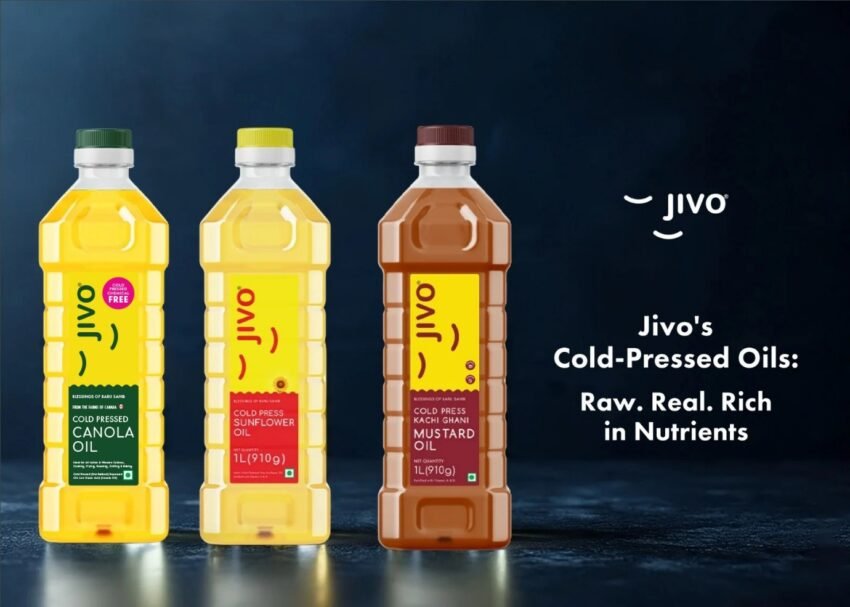More than half of Indian cuisines encompass fried dishes, and it is the cooking oils that transform simple ingredients into tasty, aromatic curries, crispy fritters, and flavourful tadkas. The best cooking oils in India hold culinary magic, offering a wealth of nutrients that benefits health when chosen wisely. From heart-healthy fats to powerful antioxidants, these oils do more than just cook—they nourish. In this guide, we’ll explore the key nutrients found in healthy cooking oils in India, highlight why best cold-pressed oils in India are a smart choice, and share practical tips to help you make informed decisions for your kitchen.
The Role of Cooking Oils in Nutrition
In Indian cooking, oils are indispensable, whether you’re frying pakoras, sautéing vegetables, or drizzling them over a fresh salad. Their impact goes beyond taste and texture—oils are a significant source of essential nutrients. The best cooking oils in India are packed with healthy fats, vitamins, and plant compounds that may support heart health, reduce inflammation, and protect against chronic diseases. However, these benefits may vary from person to person depending on individual health conditions. With increasing health consciousness, healthy cooking oils are gaining popularity, especially cold-pressed oils, which retain more nutrients due to minimal processing.
Knowing what’s in your cooking oil can help you pick the best one for your health. Whether you want to manage cholesterol, boost your immunity, or just eat a balanced diet, the right oil can really help. Let’s look at the nutrients that make healthy cooking oils in India so useful and see how they can support your health.
Essential Nutrients in Healthy Cooking Oils
Healthy cooking oils are nutrient powerhouses, offering a range of benefits that complement the diverse flavours of Indian cuisine. Here’s a detailed look at the key nutrients you’ll find in a healthy cooking oil:
1. Monounsaturated Fatty Acids (MUFAs)
MUFAs are heart-healthy fats that help lower LDL (bad) cholesterol while maintaining HDL (good) cholesterol, making them a staple in healthy cooking oils in India. Oils like extra virgin olive oil (around 73% MUFAs) and avocado oil are rich in these fats, offering stability for moderate-heat cooking like sautéing onions for a curry or preparing a light stir-fry. MUFAs are linked to reduced risk of heart disease, which is crucial in India, where heart-related problems are on the rise.
Health Benefit: May help maintain blood cholesterol levels when consumed in moderation as a part of a balanced diet.
2. Polyunsaturated Fatty Acids (PUFAs)
PUFAs, including omega-3 and omega-6 fatty acids, are essential fats your body can’t produce, making them vital in your diet. Oils like flaxseed (up to 55% omega-3s), mustard, and sunflower are excellent sources. These fats may help support brain function, reduce inflammation, and aid in cell repair, making them a key component of best cooking oils in India. For example, sunflower and flaxseed oils are great plant-based omega-3 sources for vegetarians, perfect for drizzling over khichdi or blending into smoothies.
Health Benefit: Enhances brain health, reduces inflammation, and supports overall cellular function.
3. Vitamin E (Tocopherols)
Vitamin E is a potent antioxidant found in oils like sunflower, sesame, and almond oil. It protects cells from oxidative damage caused by free radicals, which can contribute to aging and chronic diseases. Sunflower oil, for instance, provides about 37 mg of vitamin E per 100 g, meeting a significant portion of your daily needs. This makes it a great addition to healthy cooking oils in India, especially for skin and immune health.
Health Benefit: May help support skin health, boosts immunity, and protect against oxidative stress.
4. Vitamin K
Vitamin K, found in oils like canola and soybean, is essential for blood clotting and maintaining strong bones. Canola oil, a versatile choice among best cooking oils in India, contains around 71 µg of vitamin K per 100 g. This nutrient is particularly important for preventing osteoporosis and ensuring proper wound healing, making it a valuable addition to your diet.
Health Benefit: May help promote bone health and support proper blood clotting.
5. Phytosterols
Phytosterols are plant compounds that mimic cholesterol in the body, helping to block its absorption in the intestines. Oils like sesame, corn, and olive oil are rich in phytosterols, with corn oil containing up to 1,000 mg per 100 g. These compounds make healthy cooking oils in India a functional food, supporting heart health by lowering LDL cholesterol levels.
Health Benefit: May help reduce cholesterol absorption, lowering the risk of heart-related issues.
6. Polyphenols and Antioxidants
Polyphenols are powerful antioxidants found in best cold-pressed oils in India, such as extra virgin olive oil. These compounds, like oleocanthal in olive oil, have anti-inflammatory properties similar to ibuprofen, making them ideal for reducing chronic inflammation. Cold-pressed oils retain these antioxidants better than refined oils, ensuring you get the maximum health benefits.
Health Benefit: Fights inflammation and protects against chronic diseases like diabetes and cancer.
7. Saturated Fats (in Moderation)
While often viewed with caution, small amounts of saturated fats in oils like coconut oil provide stability for high-heat cooking, which is common in Indian dishes like deep-fried puris. However, these should be used carefully, as excessive saturated fats can raise cholesterol levels. Coconut oil, for example, is about 90% saturated fat but can be part of a balanced diet when used in moderation.
Health Benefit: Provides heat stability for frying, but should be limited to avoid health risks.
Top Nutrient-Rich Cooking Oils for Indian Kitchens
Here’s a roundup of some best cooking oils in India that deliver these nutrients while suiting Indian cooking styles:
1. Extra Virgin Olive Oil
Extra virgin olive oil is a top pick among healthy cooking oils in India for its high MUFA content, vitamin E, and polyphenols. Its rich, fruity flavour enhances salads, chutneys, and light sautéed dishes. However, its lower smoke point (around 375°F) makes it less suitable for deep-frying. Opt for cold-pressed extra virgin olive oil, one of the best cold-pressed oils in India, to maximize its nutrient profile.
Best for: Salad dressings, marinades, and low-heat cooking.
2. Mustard Oil
Mustard oil is a North and East Indian favourite, packed with MUFAs, omega-3s, and antioxidants. Its high smoke point (around 480°F) makes it ideal for frying samosas or tempering spices for dal. Cold-pressed mustard oil, a standout among best cold-pressed oils in India, retains its pungent flavour and nutrients, making it a healthy and flavourful choice.
Best for: Tadkas, frying, and pickling.
3. Avocado Oil
Avocado oil is gaining popularity as one of the healthy cooking oils in India due to its high smoke point (around 520°F) and nutrient density. Rich in MUFAs, vitamin E, and phytosterols, it’s perfect for roasting vegetables or grilling meats. Cold-pressed avocado oil is a premium option among best cold-pressed oils.
Best for: High-heat cooking, roasting, and grilling.
4. Flaxseed Oil
Flaxseed oil is a nutrient powerhouse, especially for omega-3 fatty acids, making it ideal for vegetarians. Its low smoke point means its best used unheated, such as in dressings or smoothies. Cold-pressed flaxseed oil is a top choice for best cold-pressed oils in India.
Best for: Cold dishes, drizzling, and smoothies.
5. Canola Oil
Canola oil is a budget-friendly, versatile option among healthy cooking oils in India. It’s rich in MUFAs, PUFAs, and vitamin K, with a high smoke point (around 400°F) suitable for frying and baking. Cold-pressed canola oil ensures maximum nutrient retention.
Best for: Frying, baking, and all-purpose cooking.
6. Sesame Oil
Sesame oil, especially cold-pressed or toasted, is a South Indian staple. It’s rich in antioxidants, phytosterols, and vitamin E, with a nutty flavour that elevates dishes like sambar or stir-fries. Its moderate smoke point (around 410°F) makes it versatile.
Best for: Tempering, stir-frying, and marinades.
Why Choose Cold-Pressed Oils?
Quality cold-pressed oils are extracted without heat or chemicals, preserving their natural nutrients, flavour, and aroma. Unlike refined oils, which lose vitamins and antioxidants during processing, cold-pressed oils like olive, mustard, and canola retain their health benefits. Brands like Jivo offer high-quality best cold-pressed oils in India that are perfect for health-conscious cooks.
When shopping for healthy cooking oils, look for “cold-pressed” or “extra virgin” labels to ensure minimal processing. These oils may cost more, but their nutrient density and rich flavours make them a worthwhile investment for your health.
Practical Tips for Using Nutrient-Rich Oils
Match Oil to Cooking Method: Use high smoke point oils like avocado or mustard for frying and low smoke point oils like flaxseed for drizzling to preserve nutrients.
Store Properly: Keep oils in cool, dark places to prevent oxidation and maintain nutrient quality.
Use in Moderation: Even healthy cooking oils are calorie-dense, so use measuring spoons to avoid excess.
Choose Cold-Pressed: Opt for best cold-pressed oils to maximize nutrient retention and flavour.
Check Labels: Look for certifications like FSSAI to ensure quality and purity when buying healthy cooking oils in India.
FAQs
Why are cooking oils important in Indian cuisine?
Cooking oils not only add flavour and texture but also provide essential nutrients like healthy fats and vitamins that support overall health.
What are monounsaturated fats (MUFAs), and why should I care?
MUFAs are heart-friendly fats found in oils like olive and avocado; they help lower bad cholesterol and support heart health when used in moderation.
Which oils are good sources of omega-3 and omega-6 fatty acids?
Flaxseed, mustard, and sunflower oils are rich in polyunsaturated fatty acids (PUFAs), including essential omega-3 and omega-6, which may aid brain and cell health.
What nutrients do cold-pressed oils retain that refined oils lose?
Cold-pressed oils keep more natural antioxidants, vitamins (like E and K), and plant compounds because they’re minimally processed, unlike refined oils.
How does vitamin E in cooking oils benefit my health?
Vitamin E, found in oils like sunflower and almond, acts as a powerful antioxidant—protecting your cells and boosting immunity.
Is it okay to use oils with saturated fats like coconut oil?
Coconut oil can be used for high-heat cooking, but because it’s high in saturated fat, its best enjoyed in moderation to avoid raising cholesterol.
What are phytosterols, and which oils have them?
Phytosterols are plant compounds in sesame, corn, and olive oils that may help block cholesterol absorption, supporting heart health.
Why should I rotate different cooking oils in my kitchen?
Each oil offers unique nutrients; rotating oils ensures a diverse intake of healthy fats, vitamins, and antioxidants for balanced nutrition.
How do I choose the right oil for frying versus drizzling?
For frying, pick oils with a high smoke point like mustard or avocado; for drizzling or salads, use oils like flaxseed or extra virgin olive oil to preserve nutrients.
What’s the best way to store cooking oils to keep them fresh?
Store oils in cool, dark places to prevent oxidation and maintain their nutrient quality and flavour.
Conclusion
The best cooking oils in India are more than just a cooking essential—they’re a source of vital nutrients like MUFAs, PUFAs, vitamins E and K, phytosterols, and antioxidants. By choosing healthy cooking oils like Jivo cold-pressed extra virgin olive oil, mustard oil, and canola oil in India, you can enhance the nutritional value of your meals while keeping the flavours authentic and delicious. Whether you’re frying, sautéing, or drizzling, these oils offer a perfect blend of health and taste for Indian kitchens.


1 thought on “6 Nutrient-Rich Oils for Healthy Indian Cooking”